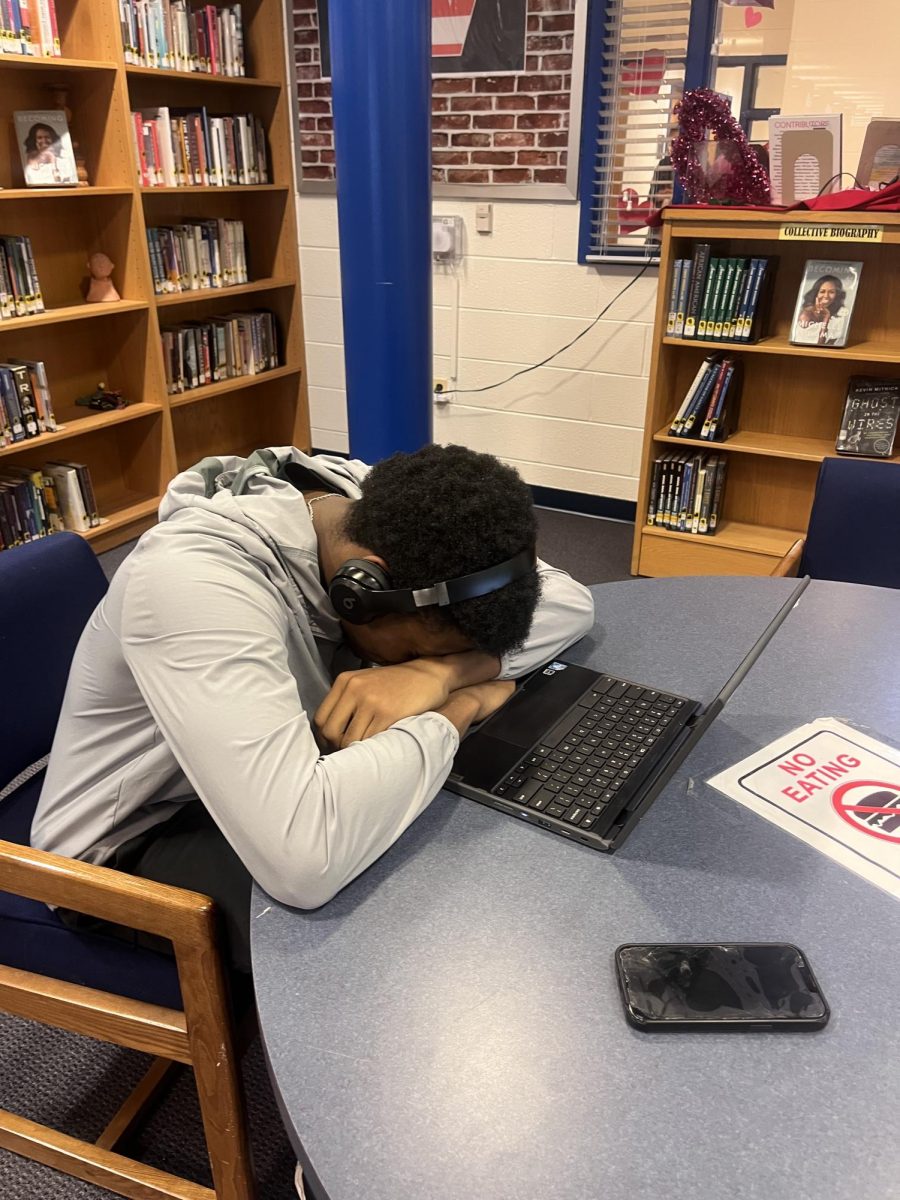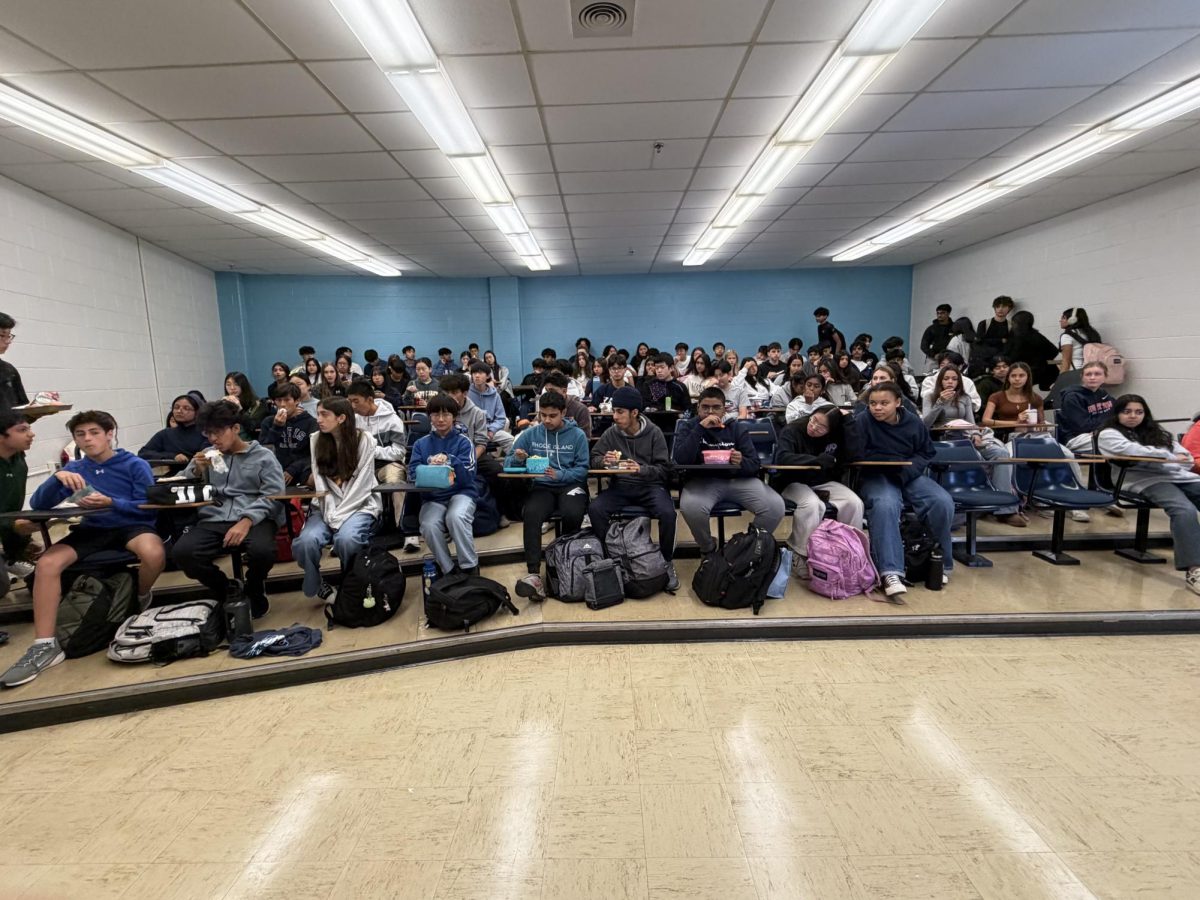A student drives home from school, walks her dog, spends an hour working out at her gym and drives to her after-school job, where she will work a six-hour shift. She drives back home at 11 p.m. as soon as her shift ends. She sets out her planner and laptop, ready to start her daily workload of studying, completing homework and SAT practice. Hours pass by, and before she knows it, the time is 2 a.m. when she finally shuts her laptop and packs up her notebooks and folders, collapsing onto her bed. The following morning, she wakes up at 6 a.m. and quickly throws on a hoodie and twists her hair into a bun, before driving to Starbucks on the way to school and ordering a venti latte with four extra espresso shots. After a long day at school, she repeats her daily after-school routine, and finishes a Celsius before sitting down at her desk once again. The caffeine she consumed throughout the day helped her stay awake in school and at her job, but leaves her finally falling asleep at 3 a.m.. The cycle repeats.
One of the hardest parts of school for this student, junior Elani Leizerov, and others like her, is something that affects students regardless of workload that varies from class to class, or the number of extracurriculars students choose to take. Time management is a skill that develops as students grow and learn more efficient and beneficial habits, but it’s still a skill that every student has struggled with.
Going from almost seven hours of lessons, presentations, tests and essays, it’s difficult to feel motivated enough or even have enough energy to start studying and completing assignments right after school. Especially because most students have jobs and sports and other commitments later in the day, coming home and doing even more work while feeling exhausted is stressful.
As these tasks get pushed later and later into the day, procrastination builds up, and students find themselves studying and wrapping up homework late into the night, cutting into valuable sleep time.
Another part of this pattern among students is the consumerism aspect of poor sleep. When students rely on caffeine to fuel the various tasks they partake in throughout the day, that means buying a Celsius or a coffee. This may seem like a cheap enough investment, but if a student needs roughly three to five caffeinated beverages per week, that would be almost $100 a month spent on artificial energy that could be gained for free by getting enough sleep needed to properly function.
A majority of students, including myself, have been victims to the alluring reassurance of caffeine and energy drinks during study times when eyelids begin to feel heavier and heavier, and the thought of a nap sounds better than anything. Succumbing to these synthetic products seems strategic, especially when there’s still tests to study for and homework to complete. Reaching for a Celsius or making a quick cup of coffee appears to be the right idea to continue to be productive during later times of the day, when deadlines are nearing and tasks need to be finished. But doing this is harmful to sleep, since caffeine effects can last hours and students are then unable to fall asleep.
This stresses one of the most popular debates among students: go to sleep at an acceptable time and risk taking a test at 7:45 in the morning and realizing you didn’t study as much as you could, or staying up late studying and finally collapsing at three in the morning with a fully completed study guide? Sophomore Hailey Goldberg thinks that both have their merits, but there’s an obvious winner. “I’d rather just skip a little bit of sleep,” Goldberg said. “So what if I lose a couple of hours? At least my grades stay up.”
Both options have their pros and cons. Subtracting a couple hours of sleep can give students just enough time to complete work that is due the next day, or get any assignments done. Most teachers make assignments due at 11:59 p.m., giving students optimal time to complete work. “I regularly turn in work even later than midnight,” Leizerov said. “Most of my work or assignments I have are turned in late into the night, because that’s when I actually have the time to do them. Because of my job, I don’t get home until late so it’s become a habit.”
However, this creates a pattern of bad sleep and studying habits. Say you do end up staying up studying and only giving yourself a couple hours of sleep. Although you will have the tools needed to succeed the following day, you will still suffer from the effects of sleep deprivation, which will affect schoolwork and attention span throughout the school day. English teacher Nicholas Confino stresses how culturally acceptable sleep deprivation is nowadays. “Kids need sleep,” Confino said. “The reality is that it’s such a cultural norm now, it’s normal for teenagers to stay up. If they’re not staying up late studying, they’re staying up texting, snapping, scrolling.”
Ultimately, the best way to stay successful in school while getting adequate amounts of sleep is to have the perfect balance between getting enough hours while staying on top of assignments. But students will still continue to invest in shortcuts like caffeine in order to stay attentive and focused as the second semester starts, and sleep hours may have to be sacrificed.









